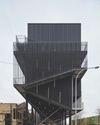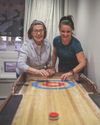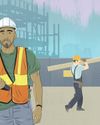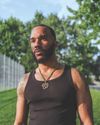
I was a curious kid, always drawn to science. I mainlined episodes of The Magic School Bus, and even though I came from an immigrant family with little money, I begged my parents to buy me chemistry kits filled with test tubes and colour-changing pH strips. Those early chemistry lessons were the gateway to my understanding of climate change. I couldn’t yet grasp complex concepts like greenhouse gases and the carbon cycle, but I did know that the tools and technologies humans created had an impact on our environment. We could make messes, but we could also help clean them up.
I was in university when I first heard about direct air capture, or DAC—the idea that you could collect carbon dioxide that had already reached the atmosphere, instead of at sources of emission, like factories or power plants. The world’s first DAC technology was developed by research groups at the University of Calgary and ETH Zurich about a decade ago. I was in grad school at the time and started researching it myself. After completing my Ph.D. at the University of Toronto in 2018, I became the youngest-ever director at the National Research Council Canada, in charge of a $60-million program to find ways to convert captured carbon into plastic.
Direct air capture involves a multi-step process: first, large fans mounted on the sides of steel or aluminum cooling towers pull in the air. It then passes through a filter, made of a liquid (like potassium hydroxide) or a solid (like metal organic frameworks, which are similar to the activated carbon in Brita filters). Clean air goes back out into the atmosphere, but the CO₂ stays behind. It is removed from the filter using energy-heat, electricity or steam then compressed into a liquid, pumped and stored two kilometres underground, in ancient ocean beds made of porous sand.
この記事は Maclean's の July 2024 版に掲載されています。
7 日間の Magzter GOLD 無料トライアルを開始して、何千もの厳選されたプレミアム ストーリー、9,000 以上の雑誌や新聞にアクセスしてください。
すでに購読者です ? サインイン
この記事は Maclean's の July 2024 版に掲載されています。
7 日間の Magzter GOLD 無料トライアルを開始して、何千もの厳選されたプレミアム ストーリー、9,000 以上の雑誌や新聞にアクセスしてください。
すでに購読者です? サインイン

Canada's Economy Is Stronger Than It Seems
Fixating on GDP blinds us to our other assets, like good health care and happiness

Pipe Dream
Winnipeg's pumphouse is a heritage building retrofitted for the housing crisis

Reuse Construction Materials
Much is lost when homes are demolished in the name of speed. With careful disassembly, high-quality materials could be used to make something new.

Trade wars, climate change, Bitcoin-B.C. Premier David Eby is preparing his province for everything
BACK IN JANUARY, with an inconveniently prorogued Parliament and the U.S. president pressing on their necks with some very un-ally-like tariff threats, Canada's premiers decided to defend themselves.

Early Retirement
I'm a university student who moved into a seniors' home in Calgary. I get affordable housing, and the residents get companionship.

"I repaired war-torn homes in Lebanon.Now I'm building houses in Canada."
I work on a construction site, overseeing a 19-acre housing development in Brampton, Ontario.

Why America Will Never Invade Canada
Donald Trump's nonsensical threats are an attempt to distract from his own country's self-destruction

HARLEM OF THE NORTH
A new exhibit spotlights the birthplace of Montreal's Black anglophone community

DEATH WISH
A group of Canadians with crushing mental illness are suing the federal government for the right to physician-assisted death. The ethics are muddy, the country is divided and the world is watching Canada's next move. Inside the crusade for a polarizing cause.

GLASS ACT
A couple trade Toronto condo life for a sun-powered hideaway in farm country
